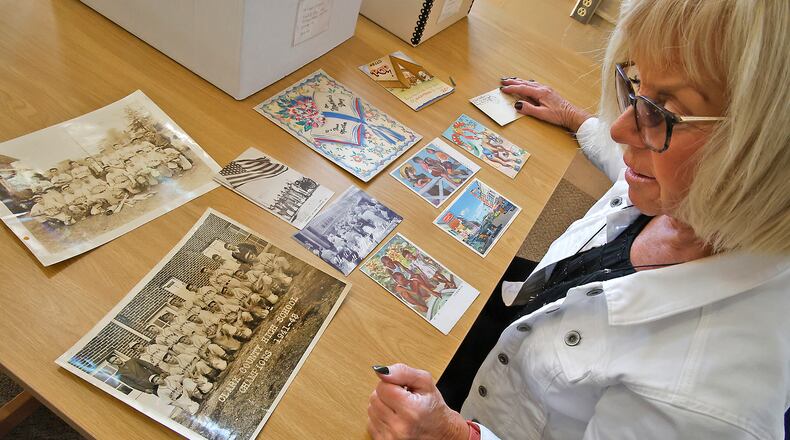The spirit of that bond is well preserved in 54 legal folders and one shoebox that house the letters and envelopes of the Mitch Papers in the archives of the Heritage Center of Clark County.
Those letters were sent to and from the Mitch home on Rural Route 1, South Vienna from March 9, 1945, to Nov. 27, 1946.
During that time, Junie went from Draft Board 4 in Downtown Springfield to Fort Hayes, Columbus, Camp Atterbury, Ind., Camp Maxie, Texas, then mountain training in the Rockies and across the Pacific Ocean to the Quartermaster Corps Depot on Saipan, where Staff Sgt. Mitch spent the final weeks of his army service.
At that last posting, he supervised 35 men and 50 Japanese prisoners of war in managing 16 warehouses that his letters tell us were the pride of the Quartermaster Corps.
Susan Hamilton said her father began to build his country strength at age 3, when he started working on his own father’s land along Columbus Road in Clark County’s Pleasant Township.
The boy who carried water to the threshers, then fed animals, milked cows, and tossed and wrestled hay bales grew strong enough to carry his tuba home the five miles McConkey Road wanders from Catawba High School to the Mitch home.
At the same high school, Junie (for Junior) was in the band of boys that won the state baseball championship with the help of the Haddix brothers, which led to Mitch visits to Cincinnati when Harvey Haddix came to town with the Pirates.
Junie’s physical strength, which was tested and grew during his army service, led to the successive years of grand-fatherhood in which he tossed bales high from the ground to those stacking them and answered the bell for the annual arm-wrestling contest in which he repeatedly pinned the arms of a son and grandson simultaneously. The shock and awe the losers’ experience eventually led them to give up the competition so they could preserve the strength of their regard for him in his prime.
In the letters they exchanged in ‘45 and ‘46 — she wrote almost daily — Grace Mitch had encouraged her son to consider futures outside of farming. But before the war ended, her husband and his father, Floyd H. Mitch, arranged to pick up additional land, and Junie began a farming life he would live to the fullest. His rise to Staff Sergeant at age 20 foreshadowed his leadership and service as president of the county branch of the National Farmers Organization for 20 years and at the state NFO for a dozen more. He also gave 20 years to the Clark County Agriculture Stabilization and Conservation Committee.
There was similar service to the International Order of Oddfellows at the local level before he went on to the organization’s Grand Lodge of Ohio, which he served as Grand Marshal, Grand Conductor, Grand Chaplain, and Grand Secretary, before being named Grand Secretary Emeritus and awarded the Meritorious Service Jewel.
But the” highest honor” of his 84 years, he noted in his 2011 obituary, was “singing the National Anthem at the Cincinnati Reds ballgame on two occasions.” In the days of the Big Red Machine, no less.
As her great stepson Greg Mann discovered in 2006, when he found them “tightly stuffed in a file cabinet,” the yeoman work of Grace’s life as a mother of five on a dairy farm are fully documented in her letters to Junie.
“I started to read a couple,” he said, “and they just fascinated me.”
That fascination led him to organize and catalog the letters for a history class he was taking back then at Ohio Northern University.
He went on to share them with his high school history students before he returned to school to become what he is now, a physician’s assistant in Springfield.
“You can read (the letters) almost like a conversation between mother and son,” he suggested — or even a history of Ohio farm life of the mid-40s.
Still, their greatest contribution may be in showing us how news of Hitler’s death, atomic bombs and the wrangling of the Allied Powers over the shape of the post-war world mixed with stories of icy Christmases, the smell of baking spice cake, and bickering over high school officiating at a farm on Rural Route 1 in South Vienna.
They are, in that way, country strong.
About the Author
